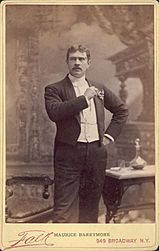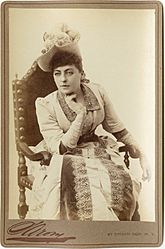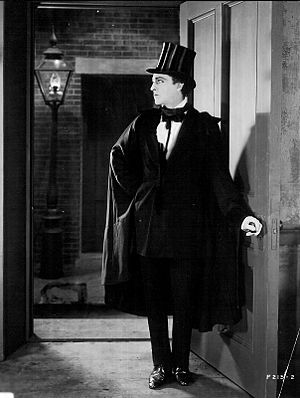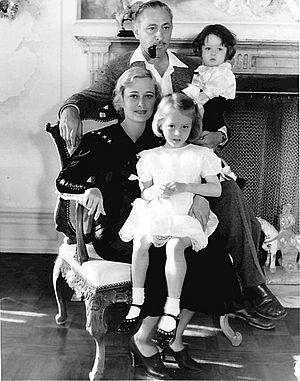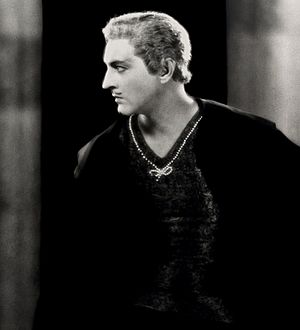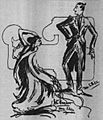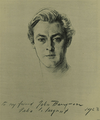John Barrymore facts for kids
Quick facts for kids
John Barrymore
|
|
|---|---|
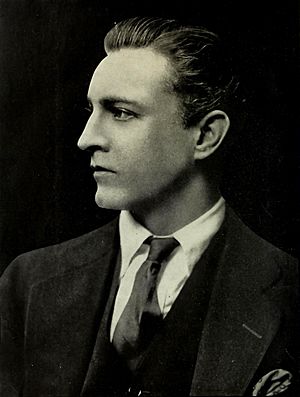
Barrymore in 1920
|
|
| Born |
John Sidney Blyth
February 14 or 15, 1882 |
| Died | May 29, 1942 (aged 60) Los Angeles, California, U.S.
|
John Barrymore (born John Sidney Blyth; 1882–1942) was a famous American actor. He performed on stage, in movies, and on the radio. John was part of the well-known Drew and Barrymore acting families.
At first, he didn't want to be an actor. He even tried to become an artist. But he ended up performing with his father, Maurice Barrymore, in 1900. The next year, he acted with his sister, Ethel Barrymore.
Contents
John Barrymore's Early Life (1882–1903)
John Barrymore was born in Philadelphia. His family and friends called him "Jack." He was born on February 14 or 15, 1882. He was the youngest of three children. His older siblings were Lionel (born 1878) and Ethel (born 1879).
His father, Maurice Barrymore, was an actor from India. His mother, Georgie Drew Barrymore, came from a famous acting family. His grandparents, Louisa Lane Drew and John Drew, were also well-known actors.
John's early life was often busy and changing. When he was a baby, his parents toured the US with a famous actress, Helena Modjeska. She even made sure all three Barrymore children were baptized into the Catholic Church. The family also lived in London for two years.
As a child, John sometimes misbehaved. He was sent to different schools to learn discipline. He went to elementary schools in four different states! At one school, he was punished by reading Dante's Inferno. He later said the pictures in the book made him want to be an artist. He was expelled in 1891.
In 1893, when John was 11, his mother died from tuberculosis. Because she toured a lot, he didn't know her very well. His grandmother mostly raised him. After their mother died, Ethel and Lionel started acting to earn money. John's father was often away on tour.
In 1898, John went to England with his father. He studied at King's College School. He returned to New York in 1900. He found a job as an illustrator for The New York Evening Journal. He earned $50 a week.
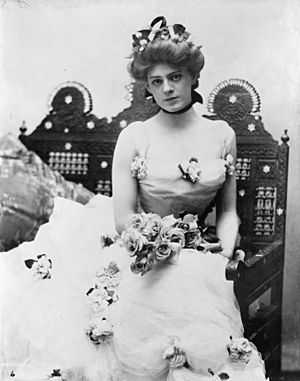
John always said he didn't like acting. But in 1900, his father convinced him to act in a play called "A Man of the World." He acted in it again the next year. He still saw it as just a way to make extra money.
In 1902, John lost his newspaper job because his drawings weren't good enough. He tried designing posters, but it didn't pay well. He told his brother, "it looks as though I'll have to succumb to the family curse, acting." He later admitted he acted because he "needed the money."
John Barrymore's Acting Career
John Barrymore started his acting career in 1903. He first became known for light comedies on stage. Then he moved to serious plays. Some of his most famous stage roles were in Justice (1916), Richard III (1920), and Hamlet (1922). His performance as Hamlet was so good that people called him the "greatest living American tragedian."
After a successful Hamlet show in London in 1925, John left the stage for 14 years. He decided to focus only on movies. In the silent film era, he starred in popular films like Dr. Jekyll and Mr. Hyde (1920) and Sherlock Holmes (1922). He also appeared in The Sea Beast (1926). During this time, he got his nickname, "the Great Profile."
When sound films came out, John's strong stage voice was a big advantage. Three of his movies, Grand Hotel (1932), Twentieth Century (1934), and Midnight (1939), are now part of the National Film Registry. This means they are considered important to American film history.
John Barrymore's Family Life
John Barrymore's personal life was often talked about. He was married and divorced four times. A writer named Martin Norden called him "perhaps the most influential and idolized actor of his day."
John Barrymore's Later Years and Death
In October 1940, John Barrymore returned to radio. On May 19, 1942, he collapsed while recording a line from Romeo and Juliet. He was taken to the hospital. He died on May 29 from health problems, including pneumonia. He was first buried in Los Angeles. In 1980, his son had his body moved to Mount Vernon Cemetery in Philadelphia.
John Barrymore's Legacy
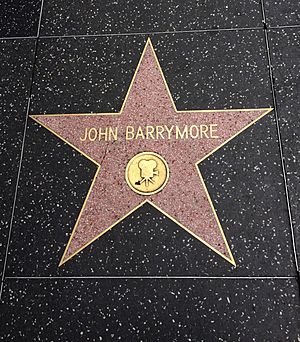
The New York Times newspaper said that most critics thought John Barrymore was the best English-speaking actor of his time. The Washington Post agreed. They said he was "the great profile" and a favorite of the "royal family" of the stage.
John Barrymore didn't win many awards from the entertainment industry. His brother and sister both won Academy Awards. But John's only award for his movie work was from Rudolph Valentino in 1925 for Beau Brummel. Valentino created his own award to honor fellow actors.
In 1940, John Barrymore visited Grauman's Chinese Theatre. He left more than just his hand and footprints in the cement. With help from the owner, Sid Grauman, John left an imprint of his famous facial profile!
In 1960, John Barrymore received a star on the Hollywood Walk of Fame. His star is at 6667 Hollywood Boulevard. He is also in the American Theater Hall of Fame with his siblings.
The Barrymore "Royal Family" of actors continued through his children. His son, John Drew Barrymore, and his daughter, Diana Barrymore, both became actors. John Jr.'s daughter, Drew Barrymore, is also a well-known actress today.
John Barrymore wrote his autobiography, Confessions of an Actor, in 1926. Many books have been written about his life and achievements since then.
In 1982, there were several events to celebrate 100 years since John Barrymore's birth. The Academy of Motion Picture Arts and Sciences and the Museum of Modern Art held a special program about his work. The US Postal Service also released a postage stamp featuring John and his siblings.
In February 2010, a street intersection in Fort Lee, New Jersey, was renamed John Barrymore Way. This was on what would have been his 128th birthday. This spot was where he first acted on stage in 1900.
Images for kids
-
Barrymore's drawing of himself and Ethel in A Slice of Life, 1912
-
Blanche Oelrichs, Barrymore's second wife (and mother of Diana Barrymore), who published poetry under the pseudonym Michael Strange
-
Dolores Costello in 1926; she was Barrymore's co-star in The Sea Beast and, later, his third wife.
-
Barrymore with Carole Lombard on a lobby card for Twentieth Century (1934)
-
(l to r), Fred MacMurray, Carole Lombard and Barrymore in True Confession, (1937)
-
Barrymore at the White House in January 1924, after meeting President Calvin Coolidge
-
Barrymore, drawn by John Singer Sargent, 1923
See also
 In Spanish: John Barrymore para niños
In Spanish: John Barrymore para niños
 | Janet Taylor Pickett |
 | Synthia Saint James |
 | Howardena Pindell |
 | Faith Ringgold |


